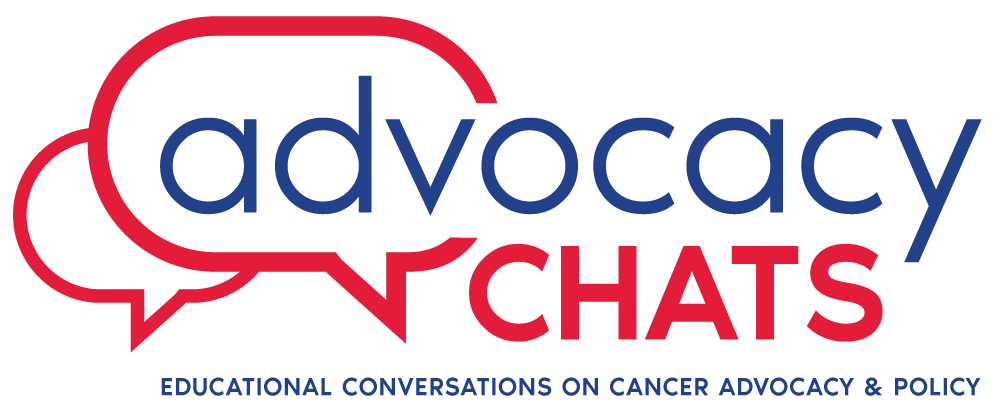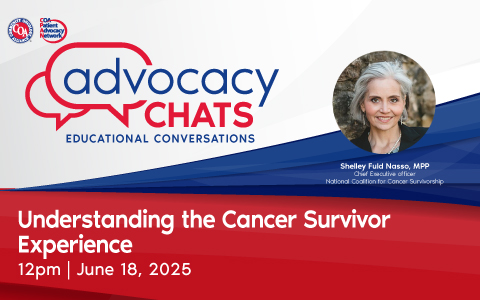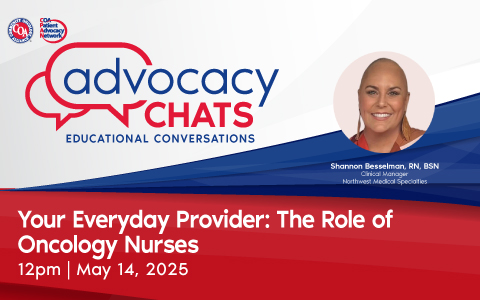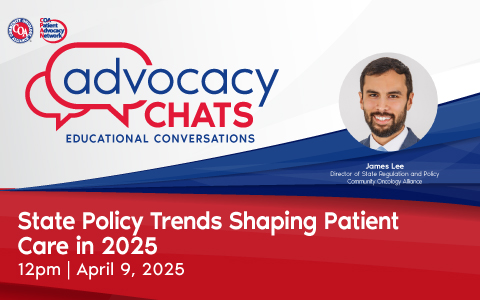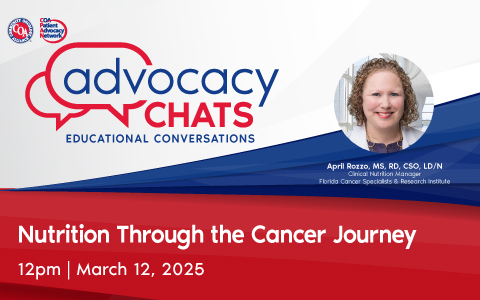What’s Legal About Cancer? Insurance, Employment, Finances
When a patient receives a cancer diagnosis, questions arise about insurance coverage, employment future, and how to pay for treatment. Patients wonder what insurance will cover, if they will lose their job because they have cancer, and if can they afford treatment. These are scary questions, and patients can be intimidated if they do not know their legal rights.
After almost two years, the monthly Advocacy Chats have covered many important topics: screening, treatment, caregivers, financial issues, and more. This chat focuses on the important legal issues affecting patients with cancer.
Rose Gerber, MS, COA’s director of patient advocacy and education, discussed with Triage Cancer’s Monica Fawzy Bryant, Esq., a lawyer and Triage Cancer’s chief operating officer, patient rights and how to deal with the many issues that arise while patients are in cancer treatment.
Started by two cancer attorneys, Triage Cancer is a national, nonprofit organization that provides education on the legal and practical issues that may impact individuals diagnosed with cancer and their caregivers and has spent over a decade educating patients about their rights as employees undergoing cancer treatment. Monica summarized her work by saying “we talk about all the things that affect patients with cancer that don’t get talked about in the doctor’s office.”
![slide3- 12-14-2022 AdvocacyChat_Triage Cancer[84] – Read-Only (2)](https://coaadvocacy.org/wp-content/uploads/2022/12/slide3-12-14-2022-AdvocacyChat_Triage-Cancer84-Read-Only-2.jpg)
Financial Toxicity: New Term, Old Problem
The term “financial toxicity” is a term that was coined by researchers at Duke University in 2013. They compared the out-of-pocket expenses that patients with cancer incurred with the physical toxicity of cancer treatment. They concluded that “out-of-pocket expenses might have such an impact on the cancer experience as to warrant a new term: ‘financial toxicity.’ Out-of-pocket expenses related to treatment are akin to physical toxicity, in that costs can diminish the quality of life.”
The research focused not only on the acute burden of the cost of cancer care during treatment but also on the long-term burden that is faced. They recognized that the burden is not only borne by those with cancer but may also extend to caregivers and family members. Ten years later this is still the subject of conversation at almost every cancer event. Why?
Contributing Factors to Financial Toxicity
There are multiple factors that contribute to financial toxicity. If the health care community does not address most, or even all, of the factors, the problem will never be solved. Many times, when people talk about financial toxicity, they are focused on the cost of the care itself. At the end of the day, that is not an accurate identifier of whether or not someone will experience financial toxicity.
There are easier-to-tackle contributing factors – the primary one being health insurance status. For some, this means not having health insurance at all, but more often it means not having adequate health insurance or the right health insurance. Sometimes it means, even with good insurance, not understanding how to navigate or use that insurance is still difficult. There is no system to teach people about using their insurance, about why there may be a copay, or even the basics of their own coverage.
While health insurance is probably the most significant factor in determining financial toxicity, the second most significant factor is employment changes. This can be about the person who has been diagnosed, but it can also be about the caregivers who experience employment changes due to their role as a caregiver. This is often a spouse who needs to take time off to care for their loved one. That can have a profound effect on their overall employment and on their entire family.
All of the things that happen in life that can have a financial impact on our lives continue to happen even after a cancer diagnosis. Relationship changes, moving, and graduating from school all can impact finances and can begin to compound the financial burden that someone might be carrying.
The Whole Picture
![slide7-12-14-2022 AdvocacyChat_Triage Cancer[84] – Read-Only (2)](https://coaadvocacy.org/wp-content/uploads/2022/12/slide7-12-14-2022-AdvocacyChat_Triage-Cancer84-Read-Only-2.jpg)
Managing all of these factors can be like putting together a 1,000-piece puzzle without seeing the picture on the box. It is hard to put the pieces together when you cannot see the big picture. That is how life can feel to many after they experience a cancer diagnosis. They do not know how things are supposed to be and may not even understand the various puzzle pieces.
Triage Cancer tries to give people an understanding of all the puzzle pieces. When they talk about puzzle pieces they discuss:
- Federal laws which affect patients and programs to which patients may have access
- The same goes for state laws and programs
- Discussing policies and benefits patients can access through their employer, beyond what the law requires
- Exploring what types of insurance an individual may have including health, disability, supplemental, long-term care, and life insurance
- Financial assistance programs to which patients may have access
By looking at the individual details in each of these areas, patients can figure out what their overall picture looks like. This is critical because no two people will have a picture that is exactly the same.
What Is Legal about Cancer?
When we ask what is legal about cancer, it is obvious that health insurance is rooted in the law. Employment rights are no different, but many are surprised to find out that almost everything related to cancer care is rooted in the law. A small snapshot of the various legal issues that patients with cancer face and with which they may need help includes:
- Access to care
- Funding for research
- Approval of treatments
- Insurance
- Health
- Disability
- Life
- Long-term
- Government benefits
- Employment
- Education rights
- Estate planning
- Medical decision-making
- Death with dignity laws
- Family law
- Finances and consumer law
- Medical bills
- Bankruptcy
- Genetics
- Veterans’ rights
- Caregivers’ rights
And there are more.
Almost everything is rooted in access to care. If someone does not have time off to get the necessary screenings and diagnosis, they do not have access to care. If a patient needs more time off for treatment but is in danger of losing their job and thus their health insurance if they take the time, this is an access to care issue.
Thinking of estate planning as an end-of-life issue is a myth that should be dispelled. With or without a cancer diagnosis, plans for one’s estate no matter how big or small should be in place. Statistics show that 68 percent of Americans don’t even have a will. There are free and low-cost options to create the necessary documents, so that conversation should become normalized and not an issue of last resort. Setting up things when the end is not as near removes some of the emotion from the conversation, making the entire process easier and less stressful. Taking the time to plan is a very loving thing for one’s friends and family. Whether death comes suddenly or is expected, dealing with financial issues adds to the burden of grief. Triage Cancer has created and made available a free, downloadable, three-part kit that explains the various documents and why they might be needed, the varying state-specific information, and finally forms for all 50 states.
Available Resources
All of the resources provided by Triage Cancer are free of charge and available on the Triage Cancer website at www.triagecancer.com.
Webinar Series
Webinar series that provides continuing education for nurses, social workers, and advocates. The 2023 schedule is available on the Triage Cancer website.
Conferences
The conference, online on May 20 and October 14, 2023, is an educational event for individuals diagnosed with cancer, caregivers, health care professionals, advocates, and others. Topics include Being an Advocate, Health Insurance, Finances, Being Prepared, Employment, and Disability Insurance.
Insurance & Financial Intensive
The intensive, one-day, online educational training is designed for health care professionals and advocates. The topics covered include the U.S. health care system, individual and employer-sponsored health insurance, Medicare and Medicaid, tips on using health insurance and appeals, navigating disability insurance and appeals, managing financial toxicity, and getting financial help. The 2023 dates are on the Triage Cancer website.
Online Materials
Over 30 different articles in seven categories provide checklists, spreadsheets, and quick guides for patients with cancer, their families, and their caregivers.
Practical Guides
There are three practical guides, each directed to a different audience – the young adult with cancer, seniors with cancer, and caregivers. A fourth guide provides information on Navigating employment, insurance, and finances.
Videos
The animated five-minute videos, available in English and Spanish, provide the most general information and are a helpful place to start for those who are newly diagnosed and just beginning their research into the complexities of cancer.
Educational Blog & E-Newsletter
The Educational blog shares late-breaking news about cancer-related issues. The blog breaks down in plain language how issues, such as the Inflation Reduction Act of 2022, affect patients with cancer.
Legal & Financial Navigation Program
Even with all the resources already mentioned, there are still many questions. Triage Cancer has created a navigation program to provide free, one-on-one help for individuals diagnosed with cancer, caregivers, and health care professionals. The navigation services explain options, provide accurate information, and empower patients to take the next steps regarding health insurance, employment, disability insurance, finances, estate planning, and more.
How to Reach Triage Cancer
Those who need more information can go to TriageCancer.org/.
CPAN Advocacy Chats are regular virtual 30-minute educational conversations about cancer advocacy and policy with a guest speaker invited to discuss issues important to patients and advocates. Summaries of previous Advocacy Chats are available on the CPAN website.
Past Advocacy Chats
